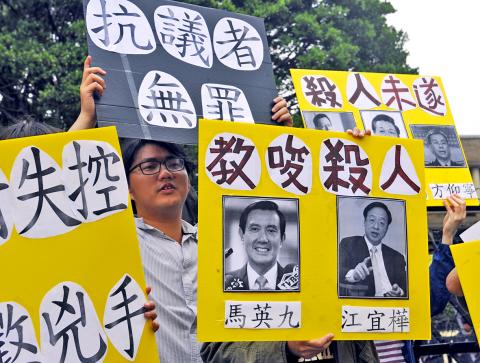The Supreme Court rejected an appeal filed by former premier Jiang Yi-huah (江宜樺), upholding a decision made by the Taiwan High Court in February asking the Taipei District Court to reconsider an attempted murder charge against Jiang over the government’s forced eviction of Sunflower movement activists from the Executive Yuan compound in Taipei last year.
Chou Jung-tsung (周榮宗), a 76-year-old activist who died last month, filed the charge against a number of officials, including Jiang, President Ma Ying-jeou (馬英九), then-National Police Agency director-general Wang Cho-chiun (王卓鈞) and other high-ranking law enforcement officials.
Chou said earlier last year that he sustained fractured ribs and other injuries when he was assaulted by police officers with a shield and later blasted by water cannons.

Photo: George Tsorng, Taipei Times
The protests at the Executive Yuan were part of the Sunflower movement, in which protesters occupied the Legislative Yuan’s main chamber in protest against the government’s handling of the cross-strait service trade agreement.
On the night of March 23 last year, student-led protesters forced their way past barricades to stage a sit-in at the Executive Yuan. Jiang authorized a crackdown in the early morning of March 24, resulting in scores of protesters reporting injuries they said were caused by officers using batons, shields and water cannons.
Chou filed the attempted murder charge with the Taipei District Court, which issued a provisional disposition ordering the police to keep for litigation video recordings, duty rosters and other documents related to the Executive Yuan eviction.
After reviewing Chou’s written statements, the district court rejected the charge in January, referring to improper procedural handling on the part of the plaintiff and ruling that Jiang and Wang did not overstep their authority by ordering the eviction of protesters, adding that Chou did not enlist any witnesses or present incriminating evidence.
However, the High Court ruled that the district court’s decision was at odds with the Code of Criminal Procedure (刑事訴訟法) by focusing on the procedural aspects of the case without conducting substantial investigations into each of Chou’s allegations. The High Court thereby remitted the case back to the district court.
Jiang appealed the High Court’s ruling to the Supreme Court, which upheld the High Court’s decision and remanded the case to the Taipei District Court.
Chou’s was the first of about 50 lawsuits filed by protesters.
Chou’s daughter took over his lawsuit after his death, she said.

INVESTIGATION: The case is the latest instance of a DPP figure being implicated in an espionage network accused of allegedly leaking information to Chinese intelligence Democratic Progressive Party (DPP) member Ho Jen-chieh (何仁傑) was detained and held incommunicado yesterday on suspicion of spying for China during his tenure as assistant to then-minister of foreign affairs Joseph Wu (吳釗燮). The Taipei District Prosecutors’ Office said Ho was implicated during its investigation into alleged spying activities by former Presidential Office consultant Wu Shang-yu (吳尚雨). Prosecutors said there is reason to believe Ho breached the National Security Act (國家安全法) by leaking classified Ministry of Foreign Affairs information to Chinese intelligence. Following interrogation, prosecutors petitioned the Taipei District Court to detain Ho, citing concerns over potential collusion or tampering of evidence. The

‘FORM OF PROTEST’: The German Institute Taipei said it was ‘shocked’ to see Nazi symbolism used in connection with political aims as it condemned the incident Sung Chien-liang (宋建樑), who led efforts to recall Democratic Progressive Party (DPP) Legislator Lee Kun-cheng (李坤城), was released on bail of NT$80,000 yesterday amid an outcry over a Nazi armband he wore to questioning the night before. Sung arrived at the New Taipei City District Prosecutors’ Office for questioning in a recall petition forgery case on Tuesday night wearing a red armband bearing a swastika, carrying a copy of Adolf Hitler’s Mein Kampf and giving a Nazi salute. Sung left the building at 1:15am without the armband and apparently covering the book with a coat. This is a serious international scandal and Chinese

Seventy percent of middle and elementary schools now conduct English classes entirely in English, the Ministry of Education said, as it encourages schools nationwide to adopt this practice Minister of Education (MOE) Cheng Ying-yao (鄭英耀) is scheduled to present a report on the government’s bilingual education policy to the Legislative Yuan’s Education and Culture Committee today. The report would outline strategies aimed at expanding access to education, reducing regional disparities and improving talent cultivation. Implementation of bilingual education policies has varied across local governments, occasionally drawing public criticism. For example, some schools have required teachers of non-English subjects to pass English proficiency

PERSONAL DATA: The implicated KMT members allegedly compiled their petitions by copying names from party lists without the consent of the people concerned Judicial authorities searched six locations yesterday and questioned six people, including one elderly Chinese Nationalist Party (KMT) member and five KMT Youth League associates, about alleged signature forgery and fraud relating to their recall efforts against two Democratic Progressive Party (DPP) legislators. After launching a probe into alleged signature forgery and related fraud in the KMT’s recall effort, prosecutors received a number of complaints, including about one petition that had 1,748 signatures of voters whose family members said they had already passed away, and also voters who said they did not approve the use of their name, Taipei Deputy Chief Prosecutor